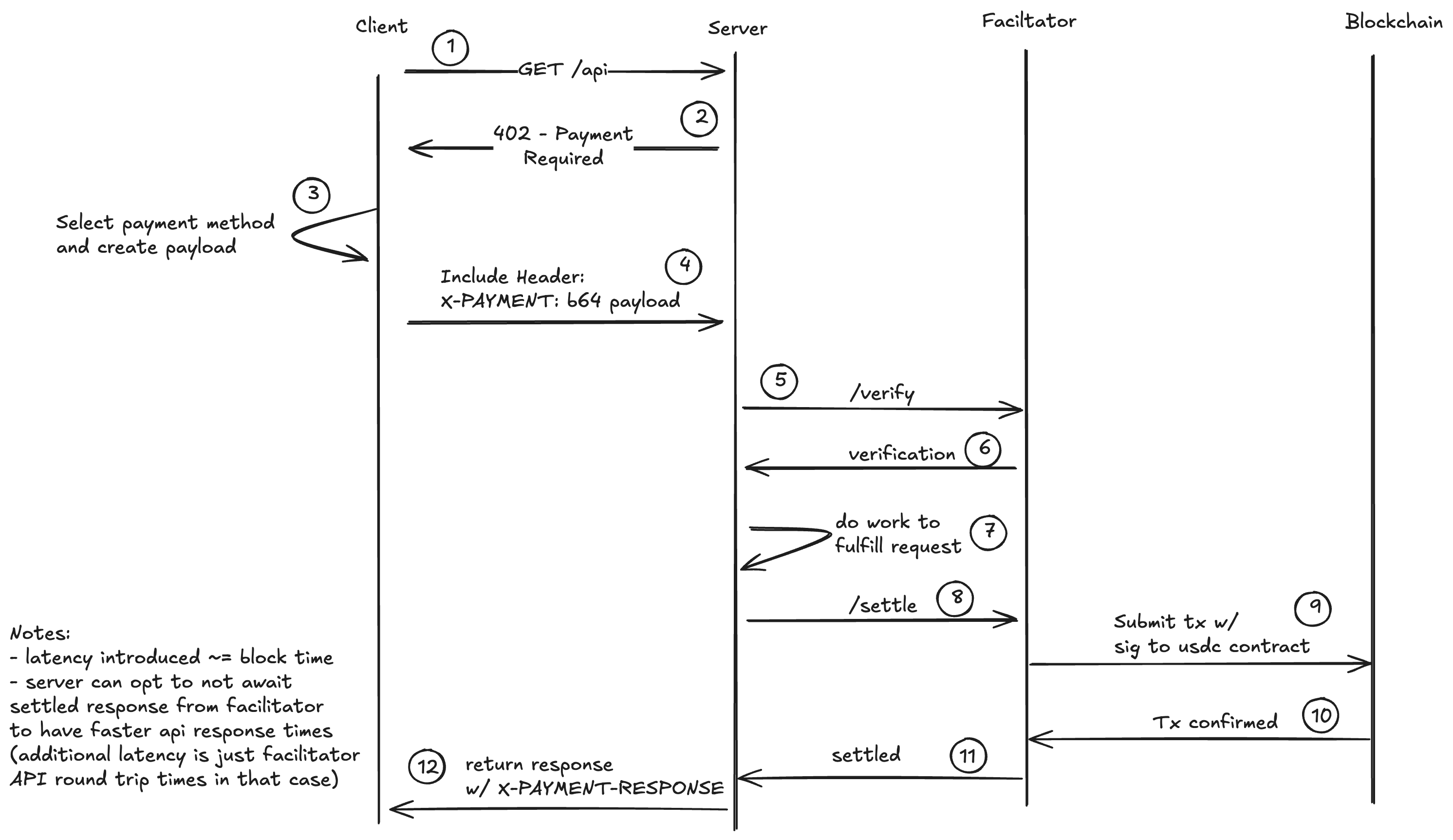Web3 Beginner Series: Exploring the New On-Chain Payment Protocol — x402
Coinbase recently announced a new payment protocol: x402. As x402 was initiated by Coinbase, it naturally supports Base Sepolia by default. It has also added support for the Solana chain, demonstrating that x402 is not bound to any specific blockchain.

https://github.com/coinbase/x402
To understand the workflow, I created a repository (https://github.com/gin-lsl/x402-solana-demo) containing the complete Server, Client, and Facilitator components. I chose Koa as the base framework to implement a scenario where a client pays with Devnet USDC (a custom token) to access a specific API endpoint provided by the server.
Some explanations
I used the spl-token tool to create the token, visible here:
https://solscan.io/token/9gKBTRXgVTszU31A12oJKKSy6aje8LyoVvNfSimembHo?cluster=devnet
Solana was selected for its developer-friendly environment, offering near-unlimited test tokens for development and testing—no login, social account binding, or mainnet wallet balance required.
Running the Project:
- Create a
.envfile with required environment variables. - Execute the following commands:
# Run Server (and Facilitator)
pnpm dev
# Run client
pnpm pay:fetchCode Explanation
The demo consolidates all components for simplicity. Key files:
solana.ts
- Provides a
/solana/get-balanceendpoint (a "valuable" API requiring payment). - Acts as the Server, handling business logic (steps 5–8 in the sequence diagram, specifically step 7).
- Allows Web2 developers to integrate Web3 payments without deep blockchain knowledge.
facilitator.ts
- Implements the Facilitator with
/supported,/verify, and/settleendpoints for chain support checks, transaction validation, and on-chain settlement. - Requires a private key to cover transaction fees (steps 9–10 in the diagram).
- Standardized; can use official templates. Adaptation needed for non-Base chains:
- For unsupported chains (e.g., Solana), simulate transactions for verification.
- Uses
@solana/kitto send transactions via RPC (sendTransaction) and confirm results (waitForRecentTransactionConfirmation).
x402-middleware.ts
- Koa middleware linking Server and Facilitator.
- Guards paid endpoints, returns HTTP 402, and routes
/verify//settlerequests. - Demo simplifications:
maxAmountRequiredset artificially high to avoid client-side validation errors.assetuses a custom Devnet token (not x402’s default). On mainnet, this should be official USDC.
- Unlike Express (which overrides
Responsefor an onion model), Koa natively supports the flow:verify → business logic → settle.
payment-client-fetch.ts
- Client role (steps 1–4). Uses
x402-fetchhelpers to:
- Auto-handle 402 responses.
- Sign transactions with the wallet’s private key.
- Resend requests with the
X-PAYMENTheader.
- Flow: Direct API call → 402 response → signature generation → retry with signed payload.
Run Commands:
# Run Server
pnpm dev
# Run client
pnpm clientClient logs/output:
> pnpm run --parallel client
server client$ tsx src/payment-client-fetch.ts
server client: [dotenv@17.2.3] injecting env (4) from .env -- tip: 🔄 add secrets lifecycle management: https://dotenvx.com/ops
server client: headers: Headers {
server client: vary: 'Origin',
server client: 'access-control-allow-origin': '*',
server client: 'content-type': 'application/json; charset=utf-8',
server client: 'content-length': '399',
server client: date: 'Fri, 31 Oct 2025 16:16:10 GMT',
server client: connection: 'keep-alive',
server client: 'keep-alive': 'timeout=5'
server client: }
server client: body: {
server client: "success": true,
server client: "data": {
server client: "address": "8dQE449ozUAS2XPyvao6hEpkAtGALo1A1q4TApayFfCo",
server client: "balance": {
server client: "lamports": "14095638085",
server client: "sol": "14.095638085"
server client: }
server client: },
server client: "paymentInfo": {
server client: "amount": 0.1,
server client: "currency": "SOL",
server client: "settled": {
server client: "success": true,
server client: "payer": "8jDsKhqYn15fhpMXMFcZJMZVkzDMAVvUgh29y2ws9iJi",
server client: "transaction": "5GJDV8AugQFJqWJYmgkmUebyYvhcZZNEq3XQ1MunXKamtgFwo7HvdjZFq55FJ77AF1gDXnJ6ogSDx27VWmPeSo5r",
server client: "network": "solana-devnet"
server client: }
server client: }
server client: }
server client: no x-payment-response header, status: 200
server client: DoneReflections
If earlier Web3 efforts focused on user accessibility (payments, investments), x402 targets Web2 developers by lowering barriers to Web3 payment integration.
While x402/client helpers streamline user payments (e.g., via USDC wallets), the protocol’s greater impact lies in empowering service providers.
Challenges for adoption:
- Enterprises with legacy settlement systems may resist due to integration complexity and regulatory concerns.
- Node RPC providers could leverage x402 to monetize advanced APIs (e.g., transaction acceleration).
Final Note:
x402 is a foundational standard, not a solution. Its value lies in unifying ecosystems around a shared specification. Rational evaluation is crucial—avoid hype traps.
About ZAN
As a technology brand of Ant Digital Technologies for Web3 products and services, ZAN provides rich and reliable services for business innovations and a development platform for Web3 endeavors.
The ZAN product family includes ZAN Node Service, ZAN ZK Acceleration, ZAN Smart Contract Audit (AI Scan/Expert Audit), with more products in the pipeline.